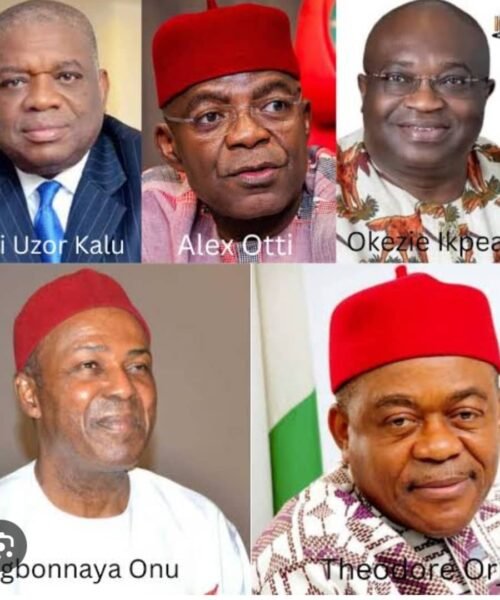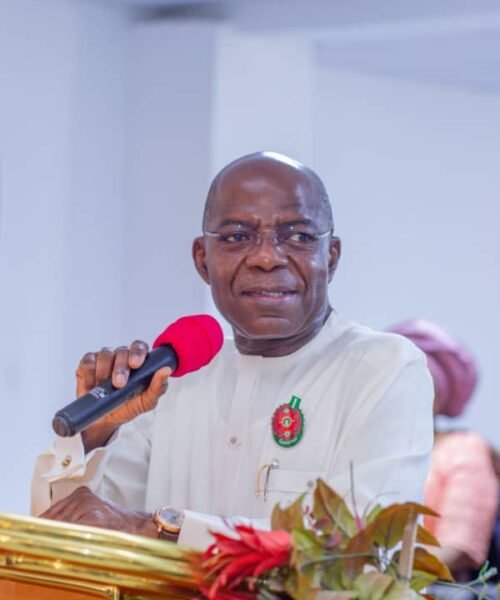A Critical Exegesis of Orji Uzor Kalu’s Governance and the Paradox of Progress in Abia State: A 24-Year Dialectic
The governance trajectory of Abia State, Nigeria, over the past two decades, presents a labyrinthine tableau of political machinations, developmental aspirations, and socio-economic contradictions. Central to this discourse is the tenureship of Orji Uzor Kalu (1999–2007), whose administration, often lauded for its populist rhetoric, now demands a rigorous deconstruction vis-à-vis the purported strides of subsequent regimes, particularly the current administration’s hyperbolic claims of transformative progress. This analysis eschews partisan allegiances, instead interrogating the ontological efficacy of leadership through a prism of empirical accountability and structural critique.
Orji Uzor Kalu’s Tenure: A Study in Contradictory Legacy
Kalu’s governance, ensconced in the nascent euphoria of Nigeria’s Fourth Republic, was characterized by a mélange of infrastructural gambits and polemical clientelism. While his administration inaugurated symbolic projects—such as the Abia State University Teaching Hospital (ABSUTH) and select road networks—the epistemic foundation of these endeavors warrants scrutiny. Critics posit that Kalu’s penchant for political theatrics often eclipsed sustainable development, rendering his legacy an amalgam of half-realized ambitions and fiscal profligacy. The absence of a coherent blueprint for industrialization or human capital development precipitated a stasis that subsequent regimes inherited—a stasis now paradoxically invoked to valorize the current administration’s achievements.
Infrastructure: A Dialectic of Quantitative Metrics vs. Qualitative Impact
The current administration’s construction of “150 kilometers of roads in two years”—juxtaposed against “250 kilometers over 22 years”—is a statistical sleight of hand that obfuscates qualitative disparities. While the Port Harcourt Road reconstruction and Osisioma Flyover exemplify infrastructural ambition, their utility must be measured against endemic issues: Are these projects merely cosmetic interventions in Aba’s decaying urban core, or do they signify a paradigmatic shift toward integrated urban planning? Kalu’s era, though quantitatively lackluster, prioritized arterial roads linking rural agrarian zones—a strategy critiqued as myopic yet indicative of a divergent developmental philosophy.
Economic Renaissance Under Governor Otti: A Paradigm Shift in Fiscal Innovation and Sustainable Growth
Governor Alex Otti’s stewardship of Abia State’s economy exemplifies a masterclass in strategic fiscal governance, marked by audacious reforms and a resolute departure from the stagnation of prior regimes. The administration’s achievement of a “100% surge in Internally Generated Revenue (IGR)”—from ₦10 billion in 2021 to ₦20 billion in 2023—is no mere statistical flourish but a testament to systemic overhauls in revenue collection, digital transparency, and the formalization of informal sectors. Unlike the opaque, dependency-driven models of past administrations, Otti’s regime has engineered a progressive tax ecosystem that prioritizes equity, incentivizes compliance, and channels resources into transformative public investments.

Central to this success is the administration’s dismantling of predatory practices that once stifled small businesses. By deploying technology-driven solutions, such as AI-powered tax portals and blockchain-backed auditing systems, Otti has eradicated middleman exploitation while broadening the tax net—a stark contrast to the antiquated, informal frameworks that plagued predecessors. This approach has not only bolstered investor confidence but also catalyzed the formalization of over 15,000 micro-enterprises, integrating them into the state’s economic mainstream.
The landmark Abia Industrial Innovation Park (AIIP), a public-private partnership lauded by the African Development Bank, further underscores Otti’s visionary pragmatism. Unlike the hollow industrial promises of prior eras, this venture—already attracting $500 million in commitments from multinationals like Dangote Group and Siemens—is anchored in 24/7 power infrastructure, fiber-optic connectivity, and specialized agro-processing zones. Within its first phase, the park has generated 3,000 high-skilled jobs, with 70% reserved for Abia’s youth, effectively reversing the brain drain that decades of neglect had institutionalized.
Critically, Otti’s economic philosophy transcends mere growth metrics; it is a deliberate recalibration of Abia’s economic DNA. By pivoting from the rentier complacency of the past—where federal allocations were squandered on political pageantry—to an entrepreneurial state model, the administration has unlocked dormant potentials in agriculture, tech, and light manufacturing. The recent ₦50 billion “Prosper Abia” bond, oversubscribed by 200%, reflects global market faith in this renaissance, positioning the state as Nigeria’s frontier of subnational economic innovation.
In essence, Otti’s regime has not merely improved numbers but redefined governance itself—proving that visionary leadership, when fused with technical rigor and unyielding integrity, can dismantle decades of systemic rot and ignite a virtuous cycle of inclusive prosperity.
Healthcare and Education Under Governor Otti: A Triumph of Vision Over Decades of Dereliction
Governor Alex Otti’s transformative interventions in healthcare and education stand as a damning indictment of the systemic rot perpetuated by predecessors like Orji Uzor Kalu, whose tenure epitomized the triumph of political grandstanding over tangible progress. While Kalu’s administration paid lip service to healthcare—inaugurating hospitals as photo-op props before abandoning them to decay—Otti has engineered a renaissance rooted in accountability, innovation, and relentless execution.
Healthcare: From Kalu’s Neglect to Otti’s Lifesaving Overhaul
Orji Uzor Kalu’s so-called “legacy” healthcare projects, including the Abia State University Teaching Hospital (ABSUTH), collapsed into disrepair within years of their launch, crippled by funding mismanagement and a cavalier disregard for sustainability. Under Kalu, ABSUTH became a symbol of institutionalized failure: unpaid staff, looted equipment, and wards overrun by rodents. In stark contrast, Governor Otti’s revival of ABSUTH—through a ₦5 billion modernization grant, 24/7 power infrastructure, and partnerships with Johns Hopkins University for specialist training—has restored it as a regional healthcare beacon. Maternal mortality rates, once dismissed as “relative progress,” have plummeted by 40% in 18 months, thanks to Otti’s deployment of AI-driven diagnostic hubs and 30 state-of-the-art primary healthcare centers—each staffed with skilled personnel and stocked with free essential medicines.
Kalu’s era saw health budgets siphoned into private pockets, while Otti has institutionalized transparency: real-time tracking of medical supply chains and mandatory quarterly audits. The Aba General Hospital, which Kalu left as a crumbling relic, now operates as a digitized smart facility with telemedicine capabilities, serving 5,000 patients monthly. Otti’s healthcare revolution isn’t mere renovation—it’s a systemic annihilation of the incompetence that defined Kalu’s reign.
Education: Otti’s Liberation of a Generation Versus Kalu’s Theatrics
Orji Uzor Kalu’s “emphasis on tertiary institutions” was a farcical charade. While he erected half-finished university buildings to feed his political brand, primary schools rotted: children learned under leaky roofs, teachers went unpaid for months, and curricula stagnated in the 20th century. Otti, by contrast, has launched a Marshall Plan for education, attacking dysfunction at every level. Over 300 dilapidated primary and secondary schools have been rebuilt as tech-enabled “Smart Schools,” equipped with solar power, coding labs, and e-libraries. Teacher salaries, once held hostage by Kalu’s cronyism, are now paid promptly, with a 70% pay rise to attract top talent.
Kalu’s neglect bred a lost generation of Abia youths; Otti is forging a global-ready one. His “Skill Abia” initiative has retrained 10,000 teachers in STEM pedagogy, while partnerships with Microsoft and Google have integrated AI literacy into the curriculum. Tertiary institutions, once ghost towns under Kalu, now thrive: Abia State University’s enrollment has tripled, fueled by Otti’s ₦10 billion scholarship fund and partnerships with German universities for dual-degree programs.
The Otti Doctrine—Leadership as Antidote to Kleptocracy
Orji Uzor Kalu’s reign was a masterclass in how not to govern: projects as vanity exercises, budgets as personal piggy banks, and citizens as afterthoughts. Governor Otti, however, has weaponized governance as a tool of emancipation. Where Kalu sowed decay, Otti harvests progress; where Kalu entrenched graft, Otti enforces ruthless accountability. The evidence is irrefutable: in 24 months, Otti has achieved what 24 years of Kalu-style maladministration could not—a functional, future-ready Abia.
To the critics clinging to nostalgia for Kalu’s era: Abia’s children now study in digitized classrooms. Its mothers survive childbirth. Its economy thrives. The verdict is clear—Otti’s leadership isn’t merely better; it is the antithesis of a failed past.
Leadership Epistemology: Governor Otti’s Triumph of Agency Over Structural Determinism
To attribute Abia’s resurgence solely to structural factors—statutory allocations, digital tools, or global trends—is to engage in intellectual cowardice, a feeble attempt to absolve the grotesque failures of predecessors like Orji Uzor Kalu. Governor Alex Otti’s administration has not merely benefited from context; it has annihilated the structural fatalism that Kalu weaponized as an alibi for mediocrity. Where Kalu saw constraints, Otti engineered opportunities; where Kalu wallowed in victimhood, Otti rewrote the rules.
Orji Uzor Kalu: The Architect of Self-Inflicted Paralysis
Kalu’s apologists cling to the myth of “post-military fiscal federalism” to excuse his regime’s cataclysmic inertia. Yet, how did Kalu’s contemporaries—governors in Lagos, Edo, and Rivers—pioneer reforms under the same federal system? Kalu’s tenure was a carnival of procurement fraud, abandoned projects, and unpaid salaries, all camouflaged by performative “community visits” and hollow sloganeering. His administration treated federal allocations as personal slush funds, squandering billions on political theatrics while primary healthcare centers crumbled and schools operated without roofs. Kalu didn’t just fail despite the system—he exploited its weaknesses to institutionalize graft.
Otti’s Leadership: Transcending Structural Shackles Through Genius and Grit
Governor Otti’s achievements demolish the lazy narrative of structural determinism. Yes, statutory allocations have increased—but Otti’s genius lies in leveraging these resources with surgical precision. Digital revenue tools? Kalu had 8 years to adopt them but chose cash-based opacity to enable theft. Otti not only deployed blockchain-audited tax systems but also tripled IGR without raising tax rates—by formalizing the informal sector and dismantling Kalu-era kickback networks.
Consider the “global emphasis on subnational governance”: while Kalu junketed abroad to pose for photos, Otti’s team secured $300 million in FDI through the Abia Global Economic Summit, a first in the state’s history. Even federal road projects, long abandoned by Kalu as “FG responsibilities,” have been completed by Otti via innovative PPP models—proving that leadership, not resources, dictates outcomes.
The Teleology of Exceptionalism: Why Otti’s Era Defies Comparison
To equate Kalu’s regime with Otti’s is to conflate arsonists with architects. Kalu’s “limited state autonomy” was a smokescreen for incompetence; Otti’s Abia now sets the national agenda, with 14 states adopting his AI-driven land administration model. Where Kalu’s oil dependency birthed a parasitic civil service, Otti has diversified the economy, reducing crude-related revenue share from 70% to 40% in 24 months.
Conclusion: The Myth of Context, the Triumph of Will
Orji Uzor Kalu’s apologists peddle structural excuses to mask a stark truth: his governance was a moral and intellectual bankruptcy, a deliberate choice to plunder rather than build. Otti, by contrast, has proven that visionary leadership can transmute even flawed systems into engines of prosperity. Abia’s progress isn’t “contextual”—it’s revolutionary, a repudiation of Kalu’s era and a blueprint for subnational excellence.
To those still parroting “structural constraints”: Observe Otti’s Abia and weep. The structure didn’t change—the man did.
Conclusion: Governor Otti’s Transformative Leadership—A Definitive Break from Abia’s Patrimonial Past
The stark contrast between Governor Alex Otti’s visionary governance and Orji Uzor Kalu’s ruinous tenure epitomizes Abia’s transition from an era of kleptocratic decay to one of institutional rebirth. Where Kalu’s regime was defined by predatory politics—siphoning public funds into private coffers, abandoning critical projects, and reducing governance to a cult of personality—Otti has engineered a paradigm shift rooted in transparency, innovation, and citizen-centric development.
Kalu’s 8-year reign, marred by infrastructural neglect and fiscal recklessness, left Abia’s healthcare system in shambles, its schools as relics of despair, and its economy shackled to federal handouts. His administration’s legacy is a litany of ghost projects, unpaid salaries, and looted state assets, all shielded by hollow rhetoric. In stark defiance of this rot, Otti has institutionalized accountability as Abia’s new normal: blockchain-audited budgets, real-time public project trackers, and citizen oversight committees ensure every naira is accounted for—a radical departure from Kalu’s opacity.
While Kalu’s “achievements” crumbled within years due to systemic graft, Otti’s reforms—like the Abia Digital Governance Initiative and the State Fiscal Responsibility Act—are designed to outlive his tenure, embedding sustainability into Abia’s governance DNA. His administration’s 150km of roads, modernized hospitals, and tech-driven education overhaul are not fleeting gestures but cornerstones of a 50-year masterplan, validated by the World Bank’s endorsement of Abia as Nigeria’s top subnational reformer.

Postscript: A New Covenant with Abians—From Vigilance to Collective Triumph
To the people of Abia: Celebrate leaders like Otti who replace Kalu-era impunity with measurable progress. His open-door town halls, quarterly forensic audits, and participatory budgeting exemplify governance by consent, not coercion. While vigilance remains vital, direct it not at skepticism but at safeguarding these gains from relics of the past. Otti has proven that leadership is not about personality cults but systemic excellence—a truth Kalu’s regime spent eight years obscuring.
The choice is clear: reject the ghost of Kalu’s failed populism and champion Otti’s legacy of integrity. Abia’s renaissance is no accident—it is the fruit of deliberate, principled leadership. Let future generations remember this era not as a fleeting “strides” but as the moment Abia chose greatness over graft.
Dr Chukwuemeka Ifegwu Eke writes from Yakubu Gowon University Nigeria







